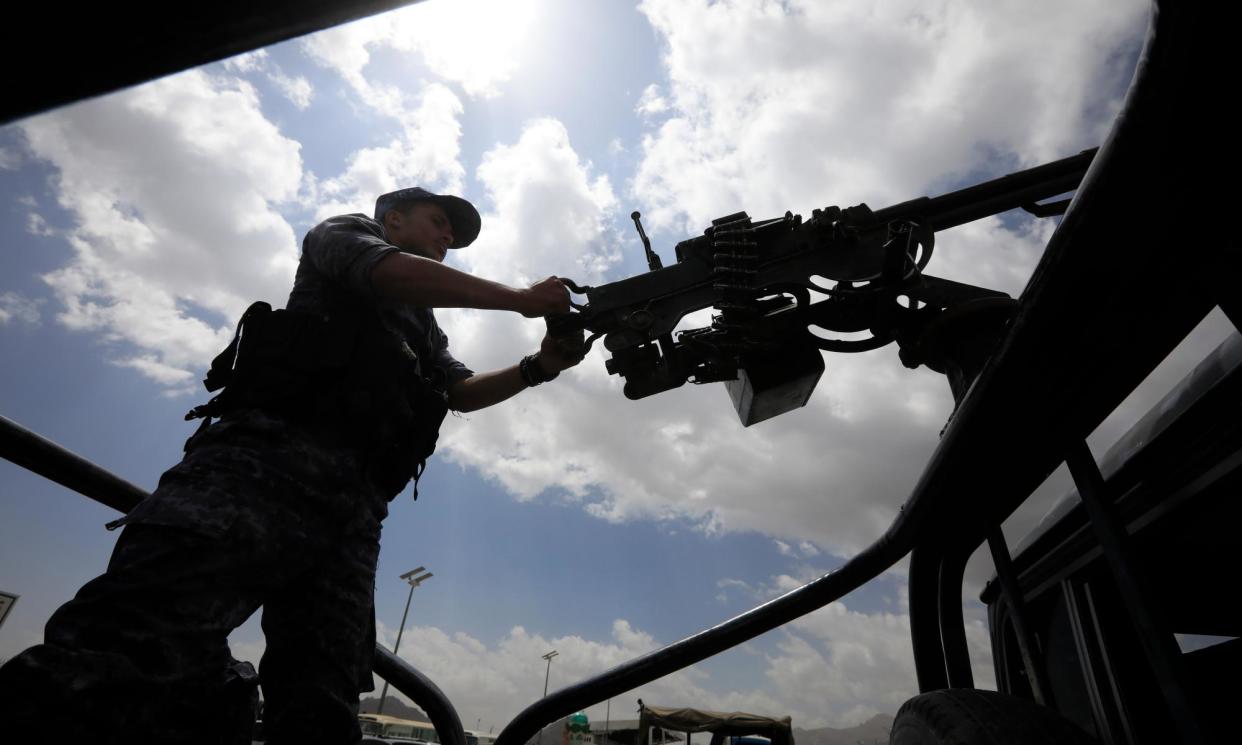UN must block Iranian missile supply to Houthis in Yemen, UK and US say

The US and UK have called for a UN maritime inspectorate to do more to prevent Iranian missiles reaching Houthi-controlled ports in the west of Yemen.
The calls during a UN security council briefing on the crisis in Yemen came as a missile believed to have been launched by Yemen’s Houthi militia struck a vessel off the southern city of Aden – but caused no damage – and US forces fired missiles on to Hodeidah international airport.
News of the latest fighting came amid a deepening of diplomatic divisions over how to handle the Houthi strikes, with Chinese and Russian envoys insisting that the US and the UK had no UN authorisation to mount repeated attacks on Houthi missile sites.
The Houthis say they are mounting the strikes on ships linked to Israel in solidarity with the Palestinians in Gaza – a claim rejected by the US and the UK.
Robert Wood, the US envoy in New York, called for the UN verification and inspection mechanism (Unvim) to be empowered to do more to tackle the supply of Iranian weapons to Houthi ports.
The verification system was set up originally in 2016 largely to satisfy Saudi Arabian demands to prevent the smuggling of weapons inside humanitarian supplies bound for Yemen. In April 2013 the UN inspected 26 ships containing cargo for Houthi-controlled ports, including the strategic port of Hodeidah.
James Kariuki, the UK deputy ambassador, echoed the US call, saying: “The inspection of vessels is fundamental to interrupting illicit arms entering Houthi-controlled areas while preserving the flow of goods into Yemen. Nearly 90% of all food in Yemen comes through commercial imports, so maintaining the integrity of these ports is vital.
“Reports of Iranian ships circumventing these inspections are therefore extremely concerning … All ships entering Hodeidah must comply and report to Unvim for inspection. We recommit our support to Unvim, so it has the necessary capacity and funding to ensure Yemenis have access to essential goods while abating the smuggling of illicit arms.”
Speaking at the same session, Dmitry Polyanskiy, the Russian deputy envoy, said: “The only diplomacy that the US recognises is gunboat diplomacy. You can take various different views of the Houthis and their demands but it is hard not to acknowledge that the crisis in the Red Sea was, to a greater or lesser extent, provoked by the brutal actions of Israel against hundreds of thousands of innocent Palestinians in the [Gaza] Strip.”
Hans Grundberg, the UN special envoy, admitted the Houthi attacks were destabilising the chances of peace in Yemen. He said: “The longer the escalatory environment continues, the more challenging Yemen’s mediation space will become.
“With more interests at play, the parties to the conflict in Yemen are more likely to shift calculations and alter their negotiation agendas. In a worst-case scenario, the parties could decide to engage in risky military adventurism that propels Yemen back into a new cycle of war.”
Farea al-Muslimi, a Chatham House expert on Yemen, said: “The Houthis have discovered they can twist the world’s arm at a very cheap price.”
He predicted the attacks would not stop until there was a ceasefire in Gaza, leading to wider regional de-escalation.
It has also been claimed that Djibouti, across the Red Sea from Yemen, is not only preventing the west from using it as a base from which to attack the Houthis, but also assisting Iranian spy ships who want to stay in Djibouti waters or even use the Chinese naval port there.
On Wednesday 20 March, 7-8.15pm GMT, join Devika Bhat, Peter Beaumont and Ghaith Abdul-Ahad as they discuss the fast developing crisis in the Middle East.


